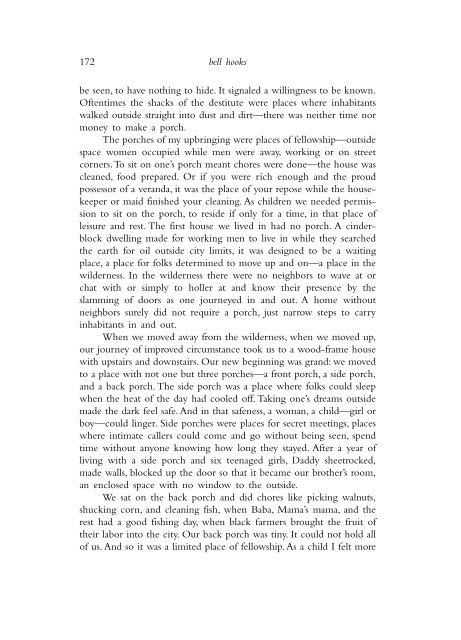You also want an ePaper? Increase the reach of your titles
YUMPU automatically turns print PDFs into web optimized ePapers that Google loves.
172 bell hooks<br />
be seen, to have nothing to hide. It signaled a willingness to be known.<br />
Oftentimes <strong>the</strong> shacks <strong>of</strong> <strong>the</strong> destitute were places where inhabitants<br />
walked outside straight into dust and dirt—<strong>the</strong>re was nei<strong>the</strong>r time nor<br />
money to make a porch.<br />
The porches <strong>of</strong> my upbringing were places <strong>of</strong> fellowship—outside<br />
space women occupied while men were away, working or on street<br />
corners. To sit on one’s porch meant chores were done—<strong>the</strong> house was<br />
cleaned, food prepared. Or if you were rich enough and <strong>the</strong> proud<br />
possessor <strong>of</strong> a veranda, it was <strong>the</strong> place <strong>of</strong> your repose while <strong>the</strong> housekeeper<br />
or maid finished your cleaning. As children we needed permission<br />
to sit on <strong>the</strong> porch, to reside if only for a time, in that place <strong>of</strong><br />
leisure and rest. The first house we lived in had no porch. A cinderblock<br />
dwelling made for working men to live in while <strong>the</strong>y searched<br />
<strong>the</strong> earth for oil outside city limits, it was designed to be a waiting<br />
place, a place for folks determined to move up and on—a place in <strong>the</strong><br />
wilderness. In <strong>the</strong> wilderness <strong>the</strong>re were no neighbors to wave at or<br />
chat with or simply to holler at and know <strong>the</strong>ir presence by <strong>the</strong><br />
slamming <strong>of</strong> doors as one journeyed in and out. A home without<br />
neighbors surely did not require a porch, just narrow steps to carry<br />
inhabitants in and out.<br />
When we moved away from <strong>the</strong> wilderness, when we moved up,<br />
our journey <strong>of</strong> improved circumstance took us to a wood-frame house<br />
with upstairs and downstairs. Our new beginning was grand: we moved<br />
to a place with not one but three porches—a front porch, a side porch,<br />
and a back porch. The side porch was a place where folks could sleep<br />
when <strong>the</strong> heat <strong>of</strong> <strong>the</strong> day had cooled <strong>of</strong>f. Taking one’s dreams outside<br />
made <strong>the</strong> dark feel safe. And in that safeness, a woman, a child—girl or<br />
boy—could linger. Side porches were places for secret meetings, places<br />
where intimate callers could come and go without being seen, spend<br />
time without anyone knowing how long <strong>the</strong>y stayed. After a year <strong>of</strong><br />
living with a side porch and six teenaged girls, Daddy sheetrocked,<br />
made walls, blocked up <strong>the</strong> door so that it became our bro<strong>the</strong>r’s room,<br />
an enclosed space with no window to <strong>the</strong> outside.<br />
We sat on <strong>the</strong> back porch and did chores like picking walnuts,<br />
shucking corn, and cleaning fish, when Baba, Mama’s mama, and <strong>the</strong><br />
rest had a good fishing day, when black farmers brought <strong>the</strong> fruit <strong>of</strong><br />
<strong>the</strong>ir labor into <strong>the</strong> city. Our back porch was tiny. It could not hold all<br />
<strong>of</strong> us. And so it was a limited place <strong>of</strong> fellowship. As a child I felt more
















